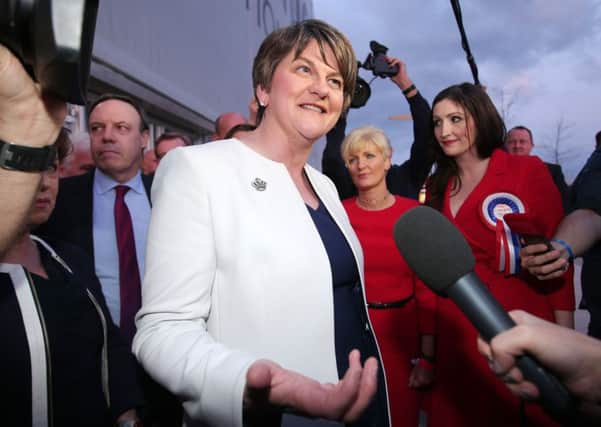Sam McBride: Stunning triumph for Foster; serious concern for nationalism


Although Arlene Foster has only been leader since December, she can bask in the glory not only because she would have taken the blame if the party’s total had fallen, but also because the DUP’s campaign was singularly constructed around her person.
Despite the DUP campaign to ‘keep McGuinness out’, there was never any realistic threat of Sinn Fein overtaking the DUP.
Advertisement
Hide AdAdvertisement
Hide AdNevertheless, it was widely thought – and I expected – that the DUP would shed several seats, perhaps even finishing in the low 30s.
Just eight months ago while under the leadership of the increasingly unpopular Peter Robinson, DUP sources were panicky about the possibility of a snap election over the crisis brought on by the PSNI belief that IRA members played a part in a murder.
Even a fortnight ago, senior party sources were privately warning of the potential for seat losses in a raft of constituencies, perhaps falling to 34 seats.
In that context, to return with a total which last night looked likely to be the same as its all-time record of 38 in 2011 is a triumph for Mrs Foster.
Advertisement
Hide AdAdvertisement
Hide AdThe DUP has faced criticism from some sources for its firm opposition to both same-sex marriage and liberalisation of the abortion laws.
But while it is difficult to tell why any voter has chosen a particular party, if the DUP has lost votes over those stances it appears to have found new voters to compensate for any losses.
Last night a senior DUP source claimed that some Roman Catholic voters had been voting for the party because of its stance on those moral issues.
By contrast, the results make fairly grim reading for the UUP and SDLP – and not the big break which Alliance had hoped for.
Advertisement
Hide AdAdvertisement
Hide AdThe common denominator between all three parties is that they are the bit part players in the Executive.
Although our system of government is unique, it appears that the smaller parties have not managed to break the political rule which states that the smaller parties in any coalition invariably are held accountable for their coalition’s failures while the big parties take the credit for any successes.
By contrast to their struggles, the small Green Party and People Before Profit had resounding successes and a conssitent picture of healthy gains across the Province.
For that reason, each of those parties – though all apparently intending to go back into the Executive up until polling day – are now likely to have significant internal debate about whether to opt for opposition.
Advertisement
Hide AdAdvertisement
Hide AdIn wider terms, this election has not only been a good one for DUP, but also for unionism, which has seen its vote increase in relation to that of nationalism.
That signals a problem much more signficant than the mere decline of the once-dominant nationalist party, the SDLP.
The astute nationalist commentator Chris Donnelly has for some time been warning that nationalism’s vote is shrinking.
In this election, that shrinkage accelerated as new non-unionist alternatives such as People Before Profit, independents and a Green Party which is increasingly influential offer a serious alternative to the nominally left-wing nationalist parties.
Advertisement
Hide AdAdvertisement
Hide AdTurnout fell in largely nationalist seats in the west, while the east of the Province turnout rose.
While some unionists have long lamented how their vote is fragmented by smaller parties, that competition has both sharpened their offering and brought out more voters.
By contrast, a lack of both choice and clear vision from both nationalist parties has seen nationalists increasingly either shun the polls or choose other parties.
Fianna Fail, which has been slowly building a presence in Northern Ireland, could now look at that situation and decided to organise in the Province, something which would fundamentally shift the political dynamic in a way which is difficult to predict.
Advertisement
Hide AdAdvertisement
Hide AdAlthough the seat numbers for the big parties have shifted little in this election, the message which voters have sent could be decisive for the future shape of Stormont and yet see a chamber which through an official Opposition is radically reformed.